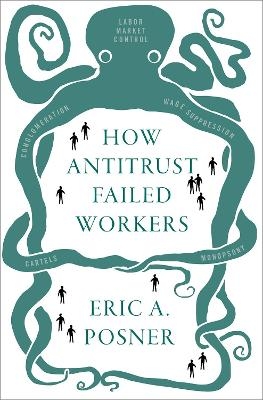
How Antitrust Failed Workers
Seiten
2021
Oxford University Press Inc (Verlag)
978-0-19-750762-9 (ISBN)
Oxford University Press Inc (Verlag)
978-0-19-750762-9 (ISBN)
A trenchant account of an unacknowledged driver of inequality and wage stagnation in America: the abandonment of antitrust law, which has allowed corporations to combine into a smaller number of massive conglomerates whose market dominance robs workers of their bargaining power.
The consequences of the massive consolidation wave in corporate America that began decades ago are now increasingly apparent: labor markets are no longer competitive. Since the 1970s, Americans have seen income and wealth inequality skyrocket--and job opportunities stagnate. There are many theories of why this happened, including the decline of organized labor and the introduction of tax policies that favored the rich. However, another crucial event was the precipitous decline in antitrust enforcement that began in earnest during the Reagan administration. With ever-increasing combination and consolidation, workers had fewer options to turn to. In How Antitrust Law Failed Workers, Eric Posner documents the role of antitrust in our economy and why it failed. Only through reforming antitrust law can we shield workers from employers' overwhelming market power.
As Posner explains, antitrust laws were created to protect the labor market by attacking monopolies, like Facebook and Google today, that are able to either charge high prices or degrade the quality of their services because customers cannot switch to competitors. Antitrust laws are also used to attack business cartels that can fix prices. In recent years, it has become clear that firms with market power not only charge higher prices; they also suppress wages and output. Many employers use anticompetitive devices--like covenants not to compete for workers and no-poaching agreements--to advance their market power at the expense of workers.
Posner shares stories that illustrate how the problem is playing out on the ground, and then contextualizes what is going on via a concise history of the American economy and labor relations since the 1980s. Essential reading for anyone interested in fighting economic inequality, How Antitrust Failed Workers also offers a sharp primer on the true nature of the American economy--one that is increasingly uncompetitive and tilted against workers.
The consequences of the massive consolidation wave in corporate America that began decades ago are now increasingly apparent: labor markets are no longer competitive. Since the 1970s, Americans have seen income and wealth inequality skyrocket--and job opportunities stagnate. There are many theories of why this happened, including the decline of organized labor and the introduction of tax policies that favored the rich. However, another crucial event was the precipitous decline in antitrust enforcement that began in earnest during the Reagan administration. With ever-increasing combination and consolidation, workers had fewer options to turn to. In How Antitrust Law Failed Workers, Eric Posner documents the role of antitrust in our economy and why it failed. Only through reforming antitrust law can we shield workers from employers' overwhelming market power.
As Posner explains, antitrust laws were created to protect the labor market by attacking monopolies, like Facebook and Google today, that are able to either charge high prices or degrade the quality of their services because customers cannot switch to competitors. Antitrust laws are also used to attack business cartels that can fix prices. In recent years, it has become clear that firms with market power not only charge higher prices; they also suppress wages and output. Many employers use anticompetitive devices--like covenants not to compete for workers and no-poaching agreements--to advance their market power at the expense of workers.
Posner shares stories that illustrate how the problem is playing out on the ground, and then contextualizes what is going on via a concise history of the American economy and labor relations since the 1980s. Essential reading for anyone interested in fighting economic inequality, How Antitrust Failed Workers also offers a sharp primer on the true nature of the American economy--one that is increasingly uncompetitive and tilted against workers.
Eric A. Posner is Kirkland and Ellis Distinguished Service Professor of Law, University of Chicago. His most recent books are Radical Markets (with Glen Weyl), which was named a best book for 2018 by The Economist; and Last Resort: The Financial Crisis and the Future of Bailouts, which was named a best book for 2018 by The Financial Times. He is of counsel at MoloLamken LLP, a fellow of the American Academy of Arts and Sciences, and a member of the American Law Institute. He has written extensively for popular media outlets, including The New York Times, The Wall Street Journal, and The Washington Post, and testified before Congress.
TC
| Erscheinungsdatum | 13.09.2021 |
|---|---|
| Verlagsort | New York |
| Sprache | englisch |
| Maße | 239 x 152 mm |
| Gewicht | 476 g |
| Themenwelt | Recht / Steuern ► Allgemeines / Lexika |
| Recht / Steuern ► Arbeits- / Sozialrecht ► Arbeitsrecht | |
| Recht / Steuern ► EU / Internationales Recht | |
| Recht / Steuern ► Wirtschaftsrecht ► Wettbewerbsrecht | |
| ISBN-10 | 0-19-750762-X / 019750762X |
| ISBN-13 | 978-0-19-750762-9 / 9780197507629 |
| Zustand | Neuware |
| Informationen gemäß Produktsicherheitsverordnung (GPSR) | |
| Haben Sie eine Frage zum Produkt? |
Mehr entdecken
aus dem Bereich
aus dem Bereich
mit Wahlordnung | Handkommentar
Buch | Hardcover (2024)
Franz Vahlen (Verlag)
95,00 €
mit den wichtigsten Bestimmungen zum Arbeitsverhältnis, …
Buch | Softcover (2024)
dtv Verlagsgesellschaft
13,90 €


